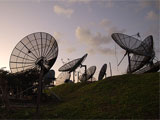The Geopolitics of Technology
13 May 2009
By James A Lewis for ISN
Technology creates new sources of power by expanding the sphere of interaction. The landscape of international relations changes people and nations grow more interdependent but without adequate tools to govern that interdependence.
Some of the changes are already apparent: the effect of jet aircraft on the movement of people or container ships on trade, or the telecommunications networks that allow instant communications around the world. The changes that diminished the barriers of distance that once separated continents and communities and limited the scope of risk have been radical indeed.
The motor of change is the desire of individuals to take advantage of the opportunities provided by technology. The immediate effect is a deep international economic integration. In looking at the many steps needed to take an idea and turn it into a product, we find that companies and workers in widely separated locations are much more closely integrated than in the past. This integration provides larger markets and lower costs. Those who participate gain greater wealth. Labor, technology and capital are now highly mobile. This globalization has eroded the idea of a national economy and reduced the control of individual nations.
The increased international mobility of highly skilled labor and the diffusion of technological expertise mean that many countries can now compete in innovative research. This can be easily overstated, but militarily useful commercial technologies for command, control and intelligence are readily available. Technological leveling gives nations some of the capabilities that were previously found only among larger powers. For example, more than 80 countries plan to build or acquire remote sensing satellites.
Services like GPS or satellite imagery that were once reserved for governments are now available to individuals and groups. The diffusion of sophisticated commercial technologies means, for example, that the Mumbai attackers could use satellite imagery and GPS data to plan and execute their attacks - services that a decade ago were only available to large states. Even the attackers’ blackberries could be used to coordinate with planners in Pakistan and get advice on media reaction and police movements.
The immediacy of the Mumbai attacks was reinforced by new social network technologies. Guests in the besieged hotel used mobile communication devices to provide updates of the situation. The notion that a guest in a burning hotel caught in a gun battle would take the time to send an email or to “twitter” (short emails sent over a social networking site) illustrates the powerful attraction of the new technologies.
The economic effects of global interconnectivity are well known. We are beginning to see the political effects that accompany the redistribution of wealth, productive capabilities and advanced technologies. New, internet-based “social networking” tools are creating powerful political forces that do not fit older notions of geopolitics. They allow the creation of transnational “communities of interest.”
Take an unpleasant example: neo-Nazi skinheads. Before the internet, they existed in small pockets and their numbers were in decline. Potential recruits were dissuaded as isolated behavior appeared deviant. With the internet, individual skinheads spread across different countries discovered that they were not alone, providing mutual support. Individuals join virtual communities with shared interests and find acceptance for beliefs or activities that once seemed aberrant. The effect is to reinforce a kind of transnational extremism.
Groups that are widely separated by geography can now coalesce through the internet. They no longer need to be nationally based and can organize, raise funds, train and recruit across continents. These “communities of interest” provide an alternative to the nation-state for political power and organization. It is the combination of transnational communities, easy travel and communications and access to sophisticated technologies that creates the greatest set of challenges.
These technologies undermine traditional means of control and create new areas of political risk. There can be immediate effects - as when Falun Gong supporters used email to organize simultaneous demonstrations across China. Elites and rulers are not immune either: In 2007, Iranian President Mahmoud external pageAhmadinejad fired the head of the state telecom companycall_made after receiving a text message on his mobile phone that joked about his lack of regular bathing. Ahmadinejad claimed that the text message was a Mossad plot to undermine his government.
At a minimum, the new social technologies complicate the political environment. National governments face not only competition with other nations, but also new competitors – “non-state-actors” - and new layers of competition for legitimacy and allegiance. The resulting changes are not what some early technologists predicted: We are not seeing the withering of the state or a new utopia of self expression and liberty. Instead, the result is a more crowded global stage in which states continue to play the major roles but must compete with other actors for the audience’s loyalties and support.
The effect of these technologies can be described as “democratic,” if by democratic we mean participation in the political process, but it is not democratic in the sense of a blanket endorsement of western values or norms. The new technologies will also shift identity, as individuals identify with groups based on something other than the territory in which they live. The effect will be to increase the challenges to the legitimacy of national governments, as individuals attach political loyalty to entities other than the nation.
Technology has led to the diffusion of manufacturing and trade; we are now seeing, on a smaller scale, a similar political diffusion. There are long-term effects on the legitimacy and power of governments, but the scope and direction of these changes are unclear. New loyalties that cut across national boundaries combined with new access to information and technology will reshape international politics.
Determining how this environment will change the ability of governments to control external and internal risks will prove an increasingly complex task.

